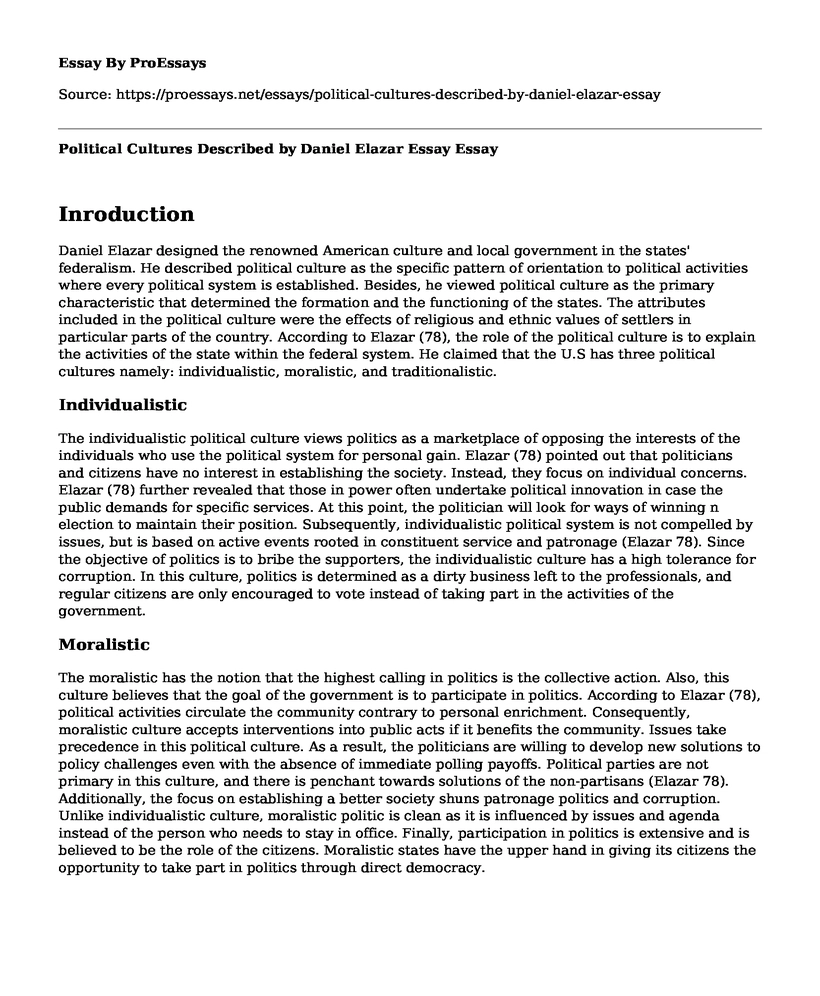Inroduction
Daniel Elazar designed the renowned American culture and local government in the states' federalism. He described political culture as the specific pattern of orientation to political activities where every political system is established. Besides, he viewed political culture as the primary characteristic that determined the formation and the functioning of the states. The attributes included in the political culture were the effects of religious and ethnic values of settlers in particular parts of the country. According to Elazar (78), the role of the political culture is to explain the activities of the state within the federal system. He claimed that the U.S has three political cultures namely: individualistic, moralistic, and traditionalistic.
Individualistic
The individualistic political culture views politics as a marketplace of opposing the interests of the individuals who use the political system for personal gain. Elazar (78) pointed out that politicians and citizens have no interest in establishing the society. Instead, they focus on individual concerns. Elazar (78) further revealed that those in power often undertake political innovation in case the public demands for specific services. At this point, the politician will look for ways of winning n election to maintain their position. Subsequently, individualistic political system is not compelled by issues, but is based on active events rooted in constituent service and patronage (Elazar 78). Since the objective of politics is to bribe the supporters, the individualistic culture has a high tolerance for corruption. In this culture, politics is determined as a dirty business left to the professionals, and regular citizens are only encouraged to vote instead of taking part in the activities of the government.
Moralistic
The moralistic has the notion that the highest calling in politics is the collective action. Also, this culture believes that the goal of the government is to participate in politics. According to Elazar (78), political activities circulate the community contrary to personal enrichment. Consequently, moralistic culture accepts interventions into public acts if it benefits the community. Issues take precedence in this political culture. As a result, the politicians are willing to develop new solutions to policy challenges even with the absence of immediate polling payoffs. Political parties are not primary in this culture, and there is penchant towards solutions of the non-partisans (Elazar 78). Additionally, the focus on establishing a better society shuns patronage politics and corruption. Unlike individualistic culture, moralistic politic is clean as it is influenced by issues and agenda instead of the person who needs to stay in office. Finally, participation in politics is extensive and is believed to be the role of the citizens. Moralistic states have the upper hand in giving its citizens the opportunity to take part in politics through direct democracy.
Traditionalistic
Lastly, traditionalistic political culture is created to preserve the status quo and benefits leaders. A limited group of wealthy landholders and business families dominates power in this culture. Traditionalistic culture discourages political participation by non-elites, and it has a low voter turnout. Only the wealthy and the privileged are allowed to take part in politics. Besides, party competition does not exist in this system (Elazar 78). Nonetheless, the dominant political party usually has various intraparty cliques that compete for power.
Political Participation and Public Opinion
Political Participation
Political participation is any action that intends to influence the election of government leaders or the activities that public leaders undertake (Harrigan and Nice 72). Political participants are categorized into two groups namely; spectators and gladiators. The most active in politics are the gladiators. They engage in activities such as involving in constant communication with public officials, donating money to a campaign, interest group or political party, volunteering to work for a party and running for a public office. In contrast, the spectators are the least active in politics. They vote, follow the political coverage and discuss politics with friends, family, and workmates.
Public Opinion
The public opinion refers to the view of the people on the relevant political issues (Harrigan and Nice 83). It is expressed through polls where participants engage in an election. Public opinion strongly impact policy when there are highly visible and emotional issues. One instance is in the case of racial discrimination where public opinion was solidly against it; therefore, it was hard to enact this policy.
Works Cited
Elazar, Daniel. Covenant and Civil Society: Constitutional Matrix of Modern Democracy. Abingdon: Routledge, 2018.
Harrigan, John and David Nice. Politics and policy in states and communities. Eleventh. New York: Pearson Education, 2013.
Cite this page
Political Cultures Described by Daniel Elazar Essay. (2022, May 23). Retrieved from https://proessays.net/essays/political-cultures-described-by-daniel-elazar-essay
If you are the original author of this essay and no longer wish to have it published on the ProEssays website, please click below to request its removal:
- Locke, Second Treatise of Government Essay Example
- America: A Superpower With Significant Economic Inequality - Essay Sample
- Essay Example on Vote Now: Pre-Register to Cast Your Ballot at Age 18!
- Essay Example on End Racial Segregation: Fedearal Government Actions to Solve Racism
- Canada's Democracy: Stable Traditions, Varied Opinions, Political Parties - Essay Sample
- Essay Example on Trump's 2017 NSS: A Roadmap for US Prosperity & Security
- Free Essay Sample: Risks Faced Australian Government







